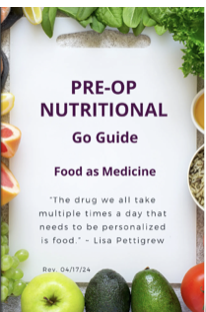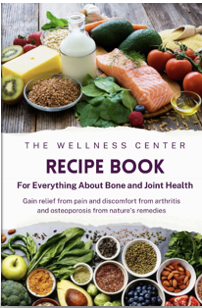Nutrition Support
Why Does Nutrition for Bone and Joint Health Matter?
Nutrition is a key component for strengthening and maintaining healthy bones as well as preventing and managing joint pain caused by arthritis. When combined with movement and exercise, healthy nutritional habits will slow the progression of diseases like osteoarthritis and osteoporosis.
Good nutrition can seem challenging at first, but small changes over time will lead to noticeable changes.
The Foods You Eat Can:
Decrease pain
Fuel your body for movement
Help you maintain a healthy weight
Build muscle and bone strength
Prepare your body for surgery
Nutrition for Osteoarthritis
What is osteoarthritis?
Osteoarthritis is a progressive disease that worsens over time, but it can be slowed and prevented by:
Maintaining a healthy weight to reduce pressure on joints and slow the wearing away of cartilage.
Staying physically active with low-impact activities.
Paying attention to your emotional health.
Nutrition plays a key part in this prevention and in the
management of pain.
What is the anti-inflammatory/arthritis diet?
The term “anti-inflammatory diet” isn’t a specific diet, but rather a style of eating. A diet rich in anti-inflammatory foods will prevent the inflammation that causes pain.
What other nutritional and diet changes will help with arthritis?
Take steps to limit saturated and trans fats and added sugars.
These fats and added sugars, often present in processed foods, contribute to weight gain. Excess weight leads to painful inflammation and adds pressure to joints, so every pound of body weight feels like 5 to 6 pounds of weight on the knees.
Instead of processed meals and snacks, prioritize “whole foods” like fresh fruits and vegetables, whole grains (oats, brown rice, and barley), nuts, beans, eggs, fish, and shellfish.
If you do not have access to fresh fruits and vegetables, frozen and canned are good substitutes as long as they don’t contain high sodium or added sugars.
Fuel your body with lean protein sources.
Lean proteins include chicken and turkey, tuna and fish, low fat cottage cheese, eggs, Greek yogurt, tofu, and beans. Whey protein powders are acceptable if you’re short on time, but it’s generally best to get your protein from whole food sources. High-quality protein along with daily movement is essential for building the muscle strength you need for movement and exercise. If your goal is to lose weight and reduce the pressure on aching joints, protein-rich foods will help you feel full longer.
A good starting point for most people is 30 grams of protein three times a day, but you should work the your Wellness Center or your PCP to determine your individual protein needs.
Remember to avoid red meat like burgers and steaks, as well as processed meats like hot dogs, brats, and sausages. While these do contain the protein you need, they will contribute to inflammation and weight gain.
Gender-Specific Differences in Osteoarthritis
There are important gender-based differences in OA that impact the development of the disease and success of treatments. Although 26% of women have arthritis (as opposed to 18% of men), women are three times less likely than men to have total joint replacement (TJR) surgery, despite having end stage degeneration. When women elect to have TJR, they are typically older and more frail, report worse arthritis pain, and have worse pre-op and post-op function scores.
Early evaluation of arthritis means that a gender-specific treatment plan can be developed. There are pain management options, specific exercises, and help with nutrition that are directly tailored for women experiencing painful arthritis. Many of these treatments can even help you safely and comfortably delay surgery.
Nutrition for Osteoporosis
What is osteoporosis?
Osteoporosis, and its precursor, osteopenia, are “silent diseases,” where bones become weak over time and are at risk of breaking. Bone loss from osteopenia and osteoporosis can be prevented or slowed down by healthy lifestyle behaviors including good nutrition. Good nutrition is essential to ensuring that the body has the protein, minerals, and vitamins it needs to regenerate bone and prevent osteopenia and osteoporosis.
Calcium
Calcium plays a critical role in building strong bones. Your body stores calcium in your skeleton and then releases it to the cells that need it. If we do not have enough calcium coming in to supply all of the body’s cells, calcium gets removed from the skeleton and bones get weak.
During your growing years, your body needs calcium to build bone mass. But calcium continues to be an essential nutrient after growth because your body loses calcium every day.
Vitamin D
Vitamin D also plays a crucial role in bone health because it helps your body absorb calcium. Without vitamin D, your body will not absorb the calcium you get, and it will start “robbing” your bones to get the calcium it needs. You get Vitamin D from sunlight (your body makes Vitamin D when exposed to UV rays in sunlight), dietary intake, and supplements.
Avoid High Sodium
Eating foods that are high in salt (sodium) causes your body to lose calcium and can lead to bone loss. Limit processed foods, canned foods, and salt added to the foods you eat each day. Look at food labels. If the label shows sodium of 20% or more for the % Daily Value, it is high in sodium. Aim to get 2,400 mg or less of sodium per day.
Nutrition for Weight Management
The basic rule for losing weight is to eat fewer calories and increase your physical activity. The Wellness Center can work with you to develop your goals and make a plan to achieve those goals.
When it comes to pain from arthritis, for every one pound of body weight your body experiences 5 to 6 pounds of pressure on your joints. So, if you gained 10 pounds your hips and knees sense that as an extra 60 pounds of pressure daily on everything you do. That also means if you lose 10 pounds, you lose 60 pounds of pressure on your joints.
Nutrition to Prepare Your Body for Surgery
If you are preparing to have surgery, proper nutrition and hydration play important roles. The best prepared patients have the best outcomes, and excess weight adversely affects the outcomes of patients!
You require a variety of nutrients (carbohydrates, fats, protein, vitamins, and minerals) in order to prepare for and recover from surgery.
In the months and weeks before surgery, it is recommended to drink 48-64 fl oz of non-caloric fluids daily (approximately 1 glass every 2 hours you’re awake).
Additional Resources
Recipe Book
Ask the Wellness Center for the “Recipe Book for Everything About Bone and Joint Health,” which goes into more detail on the anti-inflammatory diet and how calcium and vitamin D impact your bone health. It includes tips on healthy eating and provides recipes that follow those recommendations. An electronic version of the Recipe Book can be found by clicking here: https://online.fliphtml5.com/aenwg/untw/#p=1
Pre-Op Nutritional Go Guide
Ask the Wellness Center for the “Pre-Op Nutritional Go Guide,” which provides details on how to improve your nutrition pre- and post-surgery. An electronic version of the Pre-Op Nutritional Go Guide can be found by clicking here: https://online.fliphtml5.com/aenwg/rpit/#p=1





